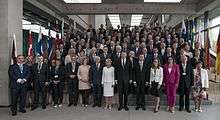Baltic Sea Parliamentary Conference

The Baltic Sea Parliamentary Conference (BSPC) was established in 1991 as a forum for political dialogue between parliamentarians from the Baltic Sea Region. BSPC aims at raising awareness and opinion on issues of current political interest and relevance for the Baltic Sea Region. It promotes and drives various initiatives and efforts to support a sustainable environmental, social and economic development of the Baltic Sea Region. It strives at enhancing the visibility of the Baltic Sea Region and its issues in a wider European context.
History
BSPC external interfaces include parliamentary, governmental, sub-regional and other organizations in the Baltic Sea Region and the Northern Dimension area, among them CBSS, HELCOM, the Northern Dimension Partnership in Health and Social Well-Being (NDPHS), the Baltic Sea Labour Network (BSLN), the Baltic Sea States Sub-regional Cooperation (BSSSC) and the Baltic Development Forum.
BSPC shall initiate and guide political activities in the region; support and strengthen democratic institutions in the participating states; improve dialogue between governments, parliaments and civil society; strengthen the common identity of the Baltic Sea Region by means of close co-operation between national and regional parliaments on the basis of equality; and initiate and guide political activities in the Baltic Sea Region, endowing them with additional democratic legitimacy and parliamentary authority.
The political recommendations of the annual Parliamentary Conferences are expressed in a Conference Resolution adopted by consensus by the Conference. The adopted Resolution shall be submitted to the governments of the Baltic Sea region, the CBSS and the EU, and disseminated to other relevant national, regional and local stakeholders in the Baltic Sea region and its neighbourhood.
Structure
BSPC gathers parliamentarians from 11 national parliaments, 11 regional parliaments and 5 parliamentary organizations around the Baltic Sea. The BSPC thus constitutes a unique parliamentary bridge between all the EU- and non-EU countries of the Baltic Sea Region.
Members
Members and Observers:
| Country name | Arms | Flag | Membership | Parliament | Membership status | Represented since | Members | EU relation | NATO relation |
|---|---|---|---|---|---|---|---|---|---|
| Denmark | |
|
full | Folketing | sovereign state | 1991 | 5 | |
|
| Estonia | |
|
full | Riigikogu | sovereign state | 1991 | |
| |
| Finland | |
|
full | Eduskunta | sovereign state | |
partnership | ||
| Germany | |
|
full | Bundestag | sovereign state | |
| ||
| Iceland | |
|
full | Alþingi | sovereign state | 1991 | associate | | |
| Latvia | |
|
full | Saeima | sovereign state | 1991 | |
| |
| Lithuania | |
|
full | Seimas | sovereign state | 1991 | |
| |
| Norway | |
|
full | Storting | sovereign state | 1991 | associate | | |
| Poland | |
|
full | Parliament of Poland | sovereign state | |
| ||
| Sweden | |
|
full | Riksdag | sovereign state | 1991 | |
partnership | |
| Åland | |
|
full | Lagting | self-governing region of Finland | 1991 | |
demilitarized zone | |
| Bremen | |
|
full | Bürgerschaft | States of Germany | |
| ||
| Faroe Islands | |
|
full | Løgting | self-governing region of the Unity of the Realm | 1991 | minimal | | |
| Greenland | |
|
full | Inatsisartut | self-governing region of the Unity of the Realm | 1991 | OCT | | |
| Hamburg | |
|
full | Bürgerschaft | States of Germany | |
| ||
| Mecklenburg-Vorpommern | |
|
full | Landtag | States of Germany | 1991 | |
| |
| Schleswig-Holstein | |
|
full | Landtag | States of Germany | 1991 | |
| |
StPetersburg,Kaliningrad,Karelia,Leningrad
See also
- Arctic Cooperation and Politics
- Baltic region
- Baltoscandia
- Council of the Baltic Sea States
- European Union
- NB8
- Nordic Council Film Prize
- Nordic Council Music Prize
- Nordic Council's Literature Prize
- Nordic Passport Union
- Nordic countries
- West Nordic Council